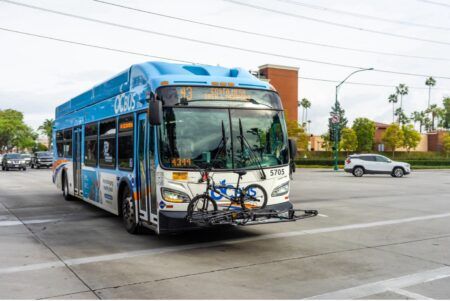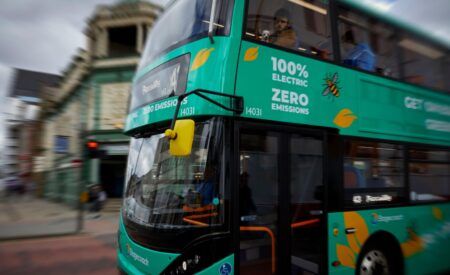Volvo Buses has announced that, in partnership with Singapore’s Nanyang Technological University (NTU), it will begin testing autonomous electric passenger buses in the city-state in 2019.
Although Volvo has already demonstrated its autonomous technology in mining, quarry and refuse collection operations, this will be its first autonomous application in public transportation anywhere in the world.
The company’s 40-foot (12m) 7900-series Electric bus is already in service around the world, providing a quiet and emission-free operation, and requiring 80% less energy than an equivalent sized diesel bus. The 40-seater buses to be deployed in Singapore will be equipped with autonomous driving technologies, including: GPS and lidar laser technology systems for charting, positioning and detecting obstacles around the vehicle, and an integrated navigation system that includes automated steering, gear changing and speed throttling technologies.
The buses will be tested from early 2019 at the NTU’s Center of Excellence for Testing and Research of Autonomous vehicles (CETRAN), which replicates different elements of Singapore’s roads, with common traffic schemes, road infrastructure and traffic rules. The circuit features a rain simulator and flood zone to test autonomous vehicles’ navigation abilities under tropical weather conditions, and also helps improve overall safety and efficiency by allowing researchers to assess the vehicles’ interaction with pedestrians. The NTU-Volvo partnership is also part of the collaboration with Singapore’s Land Transport Authority (LTA) under the university’s living lab platform, which assesses technology maturity and road-worthiness, including the certification of the technologies for deployment on public roads.
The NTU-Volvo program will be supported by Singapore’s public transport operator SMRT, which will play a critical role in determining the roadworthiness of autonomous buses and assist in operational trials. One of the buses will undergo trials at a local SMRT bus depot which will test its capabilities to autonomously navigate into vehicle washing bays and park safely at charging areas. For the development and deployment of fast-charging stations based on the OppCharge interface, Volvo and NTU will be partnering with ABB to provide a station capable of recharging in 3-6 minutes, during layover times at the route’s end points.
“We are seeing fast-growing interest in both autonomous and electric vehicles in cities all over the world. Together with NTU, we now have the possibility of testing various solutions under realistic conditions in a major city that has high ambitions for its public transport,” said Håkan Agnevall, president of Volvo Buses. “The technology developed in Singapore can contribute to our future autonomous applications.”




